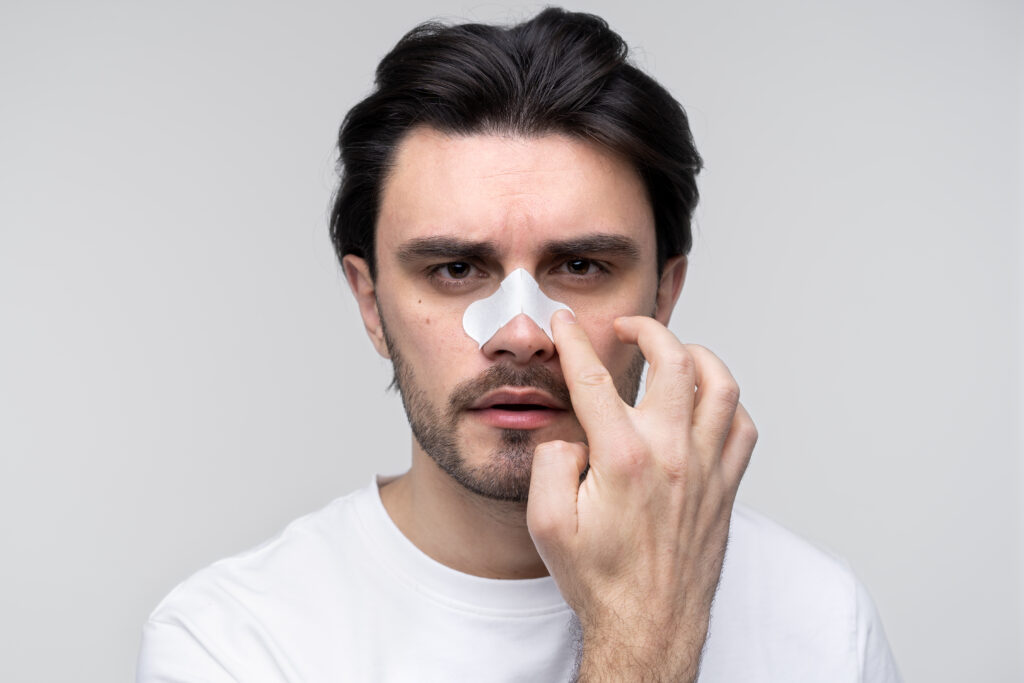Snoring is natural and usually harmless if it happens occasionally but frequent snoring is an indication of serious health conditions such as sleep disorders that can lead to severe forms of mental health issues, permanent sleep apnea, hypertension, or heart diseases. Remedies for snoring include changes in lifestyle, eating habits and sleeping habits.
What is Snoring?
Production of harsh or hoarse sounds from your throat when you breathe due to airflow past your relaxed tissues in the throat, causing vibrations in your throat tissues, is called snoring. Generally, everyone experiences snoring in life but excessive snoring can be a sign of a chronic problem. Snoring often indicates a severe health problem. In Addition, snoring can cause irritation for your sleep partner. That can ruin your relationship.
Several factors contribute to snoring including physiological and medical causes. For example, your snoring may be caused by to:
- Blockage in the nasal passage.
- Too many tissues in your throat.
- A longer or soft palate.
- Weak muscles of your throat or tongue.
Although it’s a normal phenomenon and occasional snoring doesn’t need any therapy or treatment, if it goes excessively it may be a sign of serious health issues.
Why Snoring is More Common Than You Think?
Snoring is common and out of every 2 persons 1 is affected by snoring. Even everyone experiences snoring at some point in life, including young children, adults, babies, or old age people.
But if you snore loudly, it indicates a condition of passing breathing during sleep called sleep apnea. Snoring accompanied by irritability, fatigue, or apneic episodes are alarming signs of serious sleeping disorders. Now, you should talk to your doctor.
Understanding the Causes of Snoring
During breathing, air passes through your airway consisting of the nose, mouth, and throat. The blockage in your airway produces vibrations in the tissues of your airways. That’s why the vibrations cause jarring loud snoring sounds. These rattling and rumbling sounds cause snoring. Airway blockage can be a result of several factors, including:
Use of Alcohol: People use beverages containing alcohol or certain sedatives to relax their muscles. Alcoholic drinks can cause restrictions in airflow through their nose, mouth, and throat which can lead to snoring.
Family History: The biological family link is another cause of snorting. That means if you have a biological parent who snores, you are more likely to snore because snoring runs in families.
Old Age: Old age is an indication of the onset of snoring because your muscle tone decreases as you age. This can constrict your airways creating blockage in airflow and causing snoring.
Sex: According to research, people assigned to male at birth have more tendency to snore.
Anatomy: Several factors make it difficult for the air to flow smoothly from your airways. Such as large tongue, enlarged tonsils, and big adenoids are included in these factors. Dislocation of cartilage that separates your nostrils can also block the airflow.
Weight: Being overweight is a major cause of sleep-related breathing disorders or snoring. Obesity or a body mass index of more than 22 is a clear indication of snoring.
Overall Health: Common colds, allergies, and nasal congestion are the factors causing blocked airflow through your nose and mouth. In addition, pregnant women also tend to snore more due to hormonal changes.
The Impact of Snoring on Health and Relationships
It may be weird to listen but it is true that your relationship is also affected by snoring. A 2020 study involving around 1500 married couples has shown that 20% of couples have destroyed their marriage relationship because of snoring. That means snoring is one of the major causes of the downfall of relationships in the country. Therefore, exploring the remedies for snoring is an important point of discussion for all of you.
According to the said study, 20 to 25% of couples reported regularly arguing about the snoring of their partner while 35% agreed to sleep in separate rooms due to snoring.
Believe it or not, snoring often results in the destruction of your married relationship. As you snore, your partner may not have enough shut-eye and this sleep deprivation eventually results in the worsening of their mood, sleeping habits, and mental health. Studies have also revealed that lack of sleep makes people more cranky and short-tempered. So, if you don’t get enough sleep due to your partner’s snoring, it may cause negative emotions in you. Tension and resentment due to inadequate sleep creep up in your relationship and slowly tear it apart. then, you need some effective remedies for snoring so that you may save your relationship.
In addition, sleeping in separate bedrooms can also cause a lack of physical and emotional attachment between both of you. As a result, you and your mate can go for sleep divorce.
Moreover, if your partner comes back home after a long day of work, it is easy to get some rest by sliding into the sheets. Instead, your loud snoring can keep your rhythm up at night. This will make them offenders. This snoring often seems like a trivial problem but it affects your relationship badly. Whether your partner snores or you indulge in this habit, you can understand how it can ruin your relationship. So, if you’re looking for some easy and simple remedies for snoring, this article is for you.
Tips to Stop Snoring
If you want to determine the best treatment option for your snoring, you should know the cause of snoring. Some lifestyle changes, over-the-counter medications, or medical devices can help relieve your snoring symptoms. If you have concerns about your snoring symptoms, you must talk to your healthcare provider so that they may go over your options and determine the best treatment steps for you, including simple home remedies for snoring.
Changes in your sleeping pose or positions can help you prevent snoring while nasal devices are also available to stop snoring.
As sleeping disrupts your partner’s sleep schedule or sleep cycle, you should take it as a serious disorder and try immediately to treat it. Therefore, it is advised not to ignore the snoring symptoms, even if it is not bothering you. Snoring keeps you talking about a medical condition that your doctor needs to evaluate such as sleep deprivation or sleep apnea.
In addition, sleeping on your back or taking sedatives near bedtime are the causes of snoring that should be managed.
Here are some tips to prevent or reduce snoring. Have a look!
Life Style Changes or Remedies for Snoring
Your posture of sleeping is a significant factor in causing snoring. Therefore, you should implement some simple sleep adjustments or home remedies that can help address your snoring problem. Certain lifestyle changes can help you.
Sleep on Your Side
Sleeping on your back is prohibited by healthcare providers because it makes movement in your tongue to the back of your throat, which creates a blockage in airflow in your throat. Sleeping on the right side can make air flow easy and feasible which leads to a reduction in snoring.
Get Enough Sleep
According to studies, 8 to 9 hours of sleep each night is enough for a good sleep schedule. Sleeping less than the recommended sleep hours can increase the risk of snoring. Sleep deprivation can relax your throat muscles leading to more obstruction in your airways. In addition, Interruption in sleep is another cause of sleep deprivation that can enhance the risks of snoring.
Raise Your Bedhead
Elevating your head level by the adjective your bed head may help keep your airways open to reduce snoring. Sleep aid products such as pillows or bed risers can be used for extra height.
Use a Nasal Dilator or Nasal Strips Nasal dilators are instruments that are in fact stiffened adhesive strips that are applied on the top of the nose across your nostrils to dilate the nostril’s diameter externally. This can help decrease airflow resistance, making breathing easier and stopping snoring. Inter nasal dilators are also available and you can place them inside your nose.
Nasal dilators are instruments that are in fact stiffened adhesive strips that are applied on the top of the nose across your nostrils to dilate the nostril’s diameter externally. This can help decrease airflow resistance, making breathing easier and stopping snoring. Inter nasal dilators are also available and you can place them inside your nose.
Increasing the space in the nasal passage by placing stick-on nasal strips on the bridge of your nose can help stop snoring.
Avoid Alcohol Before Bed
Avoiding alcoholic beverages at least 2 hours before going to sleep can help reduce snoring because alcohol relaxes your throat tissues and muscles which may lead to abrupt vibrations in your airways causing louder snoring. Alcoholic beverages are also dangerous for your mental and physical health. Its excessive use can cause short-term memory loss, nightmares, and sleep deprivation.
Quit Smoking
Studies have shown that smoking can impact your sleep patterns badly. This habit can worsen the snoring as well. If you smoke, your sleep may be interrupted many times, which can lead to snoring. Talk to your doctor to determine the ways to quit smoking.
Weight Management
A moderate weight saves you from several health conditions including snoring and sleep apnea. Obesity can cause relaxation in your airway muscles which can worsen the snoring symptoms. That’s why you should consider weight management options as a therapy to stop snoring. Sometimes excess tissues can cause snoring in obese people. Weight loss helps reduce the amount of tissues in the throat leading to the clearing of airway blockages.
Following these tips can also improve your condition:
- Reduce calorie intake.
- Eat Smaller portions.
- Eat nutrient-dense foods.
- Exercise regularly for athletes 30 minutes a day.
- Follow the instructions of your healthcare provider and gym trainer for weight management therapies.
- Treat Allergies Medically
Sometimes it is diagnosed medically by the health care providers that snoring is caused by some allergies that reduce the airflow through your nose, which compels you to breathe through your mouth. This practice increases the risks of snoring. Your doctor will prescribe allergy medications that can improve your condition. You can find such over-the-counter medication in the form of pills, nasal sprays, or liquids.
Using Oral Aids Oral aid appliances help increase the upper airway size during sleep which decreases the snoring frequency. These appliances can help you in:
Oral aid appliances help increase the upper airway size during sleep which decreases the snoring frequency. These appliances can help you in:
- Retracting your tongue.
- Advancing your lower jaw.
- Changing the position of the soft palate.
Your doctor will prescribe these oral aids for you on your request for snoring treatment if you have not found relief by following conservative measures.
Wearing Palatal Implants
This is a surgical treatment involving tiny implants in your soft palate to reduce tissue vibration. It is also known as the pillar procedure as it stiffens your soft palate which helps you stop snoring.
People with mild sleep apnea are recommended to get this treatment. Overweight people cannot use this treatment option.
When to Seek Medical Assistance?
You cannot find how often you snore and what are the causes. However, your sleep partner or roommate can help you in this regard. Ask them to identify the frequency and cause of your snoring. In addition, there are some symptoms that you can identify on your own:
- Dry throat during the daytime.
- Breathing from your mouth.
- Nasal congestion.
You can also find if your snoring is in a dangerous phase with the help of these indicator symptoms of snoring:
- Choking or gasping air during sleep.
- Interrupted sleep.
- Having problems concentrating or remembering.
- Sore throat.
- Feeling sleepy during the day.
- High blood pressure.
- Napping frequently during working hours.
- Experiencing chest pain often.
If the symptoms worsen, talk to your doctor to diagnose the actual cause of the severity of symptoms. Your doctor may conduct tests or a sleep study to find out your snoring patterns.
However, trying one of the above treatment programs may also help you reduce snoring and manage a better sleep pattern. However more research is required to prove the effectiveness of these treatment options with the correct diagnostic or therapeutic criteria.
Conclusion
Snoring is a common phenomenon and many adults or older people are affected by this sleep-disturbing habit. It is not a serious condition but if you snore frequently and loudly, it may become an offensive practice for others who are living with you as a roommate or bed partner.
Snoring doesn’t need any intervention if it is a seasonal attack. Allergic snoring is a temporary condition and you can relieve its symptoms by following simple home remedies for snoring along with some lifestyle changes.
However, continuous or frequent snoring may be a sign of a chronic health condition such as OSA.
Several remedial techniques and tips are discussed in this article. You can try these to help you sleep better and address your snoring symptoms.
If the symptoms get worse, discuss with your healthcare provider or a sleep professional to evaluate the best treatment option for reducing snoring.







